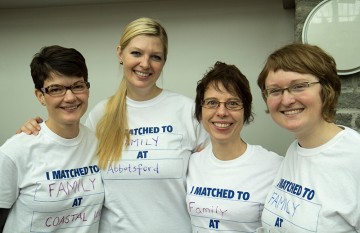
New Family Medicine residents (left to right): Jessica Palmer, Rachel Dalzell, Rachel Delacretas-Jaunich, Kristina Williams.
Fourth year MD students gathered today at the UBC Medical Student Alumni Centre to celebrate the results of the first round of the Canadian Resident Matching Service (CaRMS), which matches graduating MD students with postgraduate programs across Canada. MD students took photos, congratulated each other, and wrote their specialty and location in bright magic marker on t-shirts donated by the Canadian Medical Association
Ninety-seven per cent of 256 fourth year MD undergraduate students matched to postgraduate training programs in the first round—a strong showing in the highly competitive Canadian residency match. However, the students aren’t the only ones celebrating.
For the second year in a row, UBC’s postgraduate medical education programs accepted the largest number of entry-level postgraduate trainees in the history of UBC. Ninety-seven per cent of the 328 positions were filled in the first round of the CaRMS match, a testament to the strength of postgraduate medical education at UBC.
Once again, Family Medicine accounts for the largest percentage – nearly half of those positions, admitting 156 new residents who will complete training across British Columbia, including new offerings like Family Medicine’s Coastal site (based in North Vancouver, and provides an enhanced rural experience in communities such as Sechelt, Powell River, and Squamish).
“I am delighted to see the growth of our Family Medicine program, and their great success in attracting the best new doctors for these positions,” says Dr. Roger Wong, Associate Dean, Postgraduate Medical Education. “Our postgraduate programs are responding to the needs of British Columbians by training more family doctors and generalist specialties that support primary care.”
A new Emergency Medicine training site based in the Interior will receive its first residents this July , broadening emergency medicine training beyond sites in Vancouver, Fraser, and Vancouver Island.
UBC’s expansion and distribution of medical education programs have significantly increased the number of physicians trained in British Columbia, creating clusters of academic and clinical learning on the Island, in the North, the Interior and the Lower Mainland. New postgraduate training sites allow physicians to complete their training in communities across the province.
“Our MD undergraduate and postgraduate programs continue to see great results in the match,” says Dr. David Snadden, Executive Associate Dean, Education. “I believe this is a testament to the caliber of our students, faculty and staff, and the work and dedication of all our partners who have helped transform medical education in B.C.”
A second round of the CaRMS match for the 10 remaining unfilled positions will be held in April.
